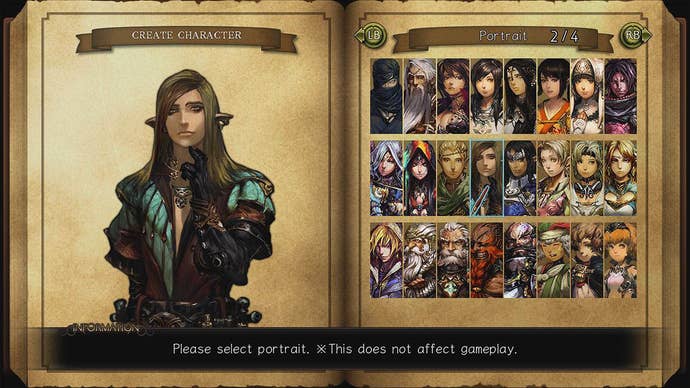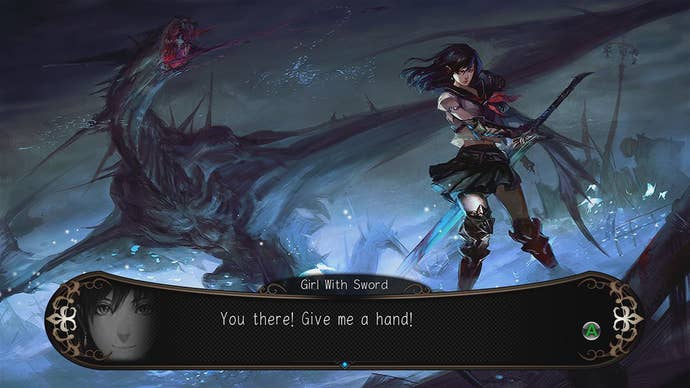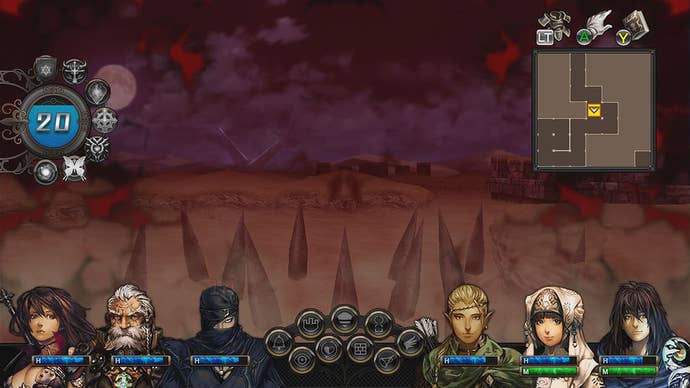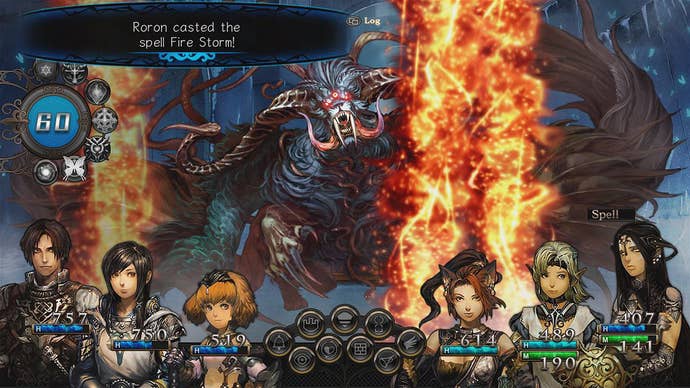Stranger of Sword City Turns Out to be More Familiar Than Its Name Suggests
While its intriguing premise isn't the only novel element this dungeon crawler brings to the table, it's ultimately business as usual.
This article first appeared on USgamer, a partner publication of VG247. Some content, such as this article, has been migrated to VG247 for posterity after USgamer's closure - but it has not been edited or further vetted by the VG247 team.
Every once in a while, I encounter a game developer I instantly admire without necessarily being able to find any real enjoyment in their creations. Falcom was like that for a long time, as was Treasure. Eventually, I came around and learned to take those companies' games on their creators' terms rather than based on my own expectations, but the process was a lot like acquiring the taste for a difficult food: It a took a conscious effort precipitated by an act of will.
We can add a new studio to that list: Experience, Inc., purveyors of unforgiving dungeon RPGs. About half of Experience's creations to date have made it to the U.S., beginning with Demon Gaze for PSP. My first encounter came a little later, with their second American localization, last year's Operation Abyss: New Tokyo Legacy. I liked that adventure in principle, but in practice I found it rather vexing. As much as I wanted to enjoy Operation Abyss, I couldn't get past how tenaciously it clung to game mechanics that went out of fashion decades ago.
But then, creating a new game experience based in concepts that have long since fallen into disuse was really the point of Operation Abyss. Experience clearly wanted to bring back the Wizardry-style dungeon crawler without any of the coddling that Atlus incorporates into games like Etrian Odyssey or Shin Megami Tensei: Strange Journey. Experience reached back to the RPGs of the early ’80s and built a game with an incredibly brutal difficulty curve, meager experience and monetary rewards, and plenty of painfully opaque mechanics to create a first-person role-player that effectively dared players to enjoy it.
Much to my disappointment, I didn't. Nevertheless, I went into Experience's latest release — Stranger of Sword City — with optimism, but also a bit more prepared for the developer's shenanigans. And while I ultimately decided, after about 10 hours, that Stranger isn't for me, either, I appreciate the fact that Experience clearly aspires to create new "old" RPGs, if that makes any sense. My frustration lies in the methods they use, which don't always quite click for me. Dungeon RPGs inherently place a heavy emphasis on challenge, but they have to walk a tricky line between "engrossingly difficult" and "loaded down with time-wasting shenanigans."

Stranger of Sword City doesn't feel like as much of an arduous chore at the outset as Operation Abyss did, but it introduces several new elements that leave me with a distinct impression that the game has very little respect for your free time. I think that may be the point, though. This style of game got its start in the dawn of the home computer age, where the source code for entire adventures had to fit into the approximate memory space of this article's text, and padding out play time through forced repetition was simply the done thing. As the need for stretching a tiny amount of material as far as it could go became less pressing, developers eased off on the brutality of their creations. Even Dark Souls, as much as people praise its unapologetic difficulty level, still plays fair, not only presenting players with tasks that can be bested through smart play rather than by relying on luck but even offering fallen warriors a chance to reclaim the experience points earned during their previous attempt (where older games would simply have stripped you of everything).
Fiendish, brutal difficulty wasn't simply a component of the Wizardry games that so clearly inspire Experience, though. In many ways, it was the point. The first two Wizardry sequels built on one another to the point that if you didn't begin with a party that had cleared the previous adventure, you basically had no chance of surviving. And then there's Wizardry IV, which has a reputation as possibly being the most brutally difficult game ever made. Experience doesn't go that far with Stranger of Sword City, but you can definitely tell that they're the sort of people who remember spending hundreds of frustrated hours with those games and feel a sort of melancholy at what has been lost.
Stranger stakes out its territory by introducing its own distinct central mechanic to the game: Elapsed time. No, it's not the first dungeon-crawler to use a clock — most roguelikes sap players' stamina with the passing of time (determined by player actions), and games like Etrian Odyssey have a day/night clock that affects the nature of enemy and even item spawns — but Stranger weaves it into the game on multiple levels, far more thoroughly than other RPGs of its type.

At its most basic level, time in Stranger affects fallen characters. When a warrior dies in battle, you have to drag their corpse back to base to allow them to sit at home and recover. This takes a few in-game days, with the passing of time determined by the number of battles you fight and the strength of the enemies you take on. While battling a trash mob burns a couple of hours, more time passes the more dangerous your foes become. In other words, when a character falls in battle, they're essentially taken out of your party for, roughly, the next hour of play. You can pay to have them revived instantly, but doing so is pricey and Stranger is one of those games in which money tends to be awfully hard to come by. As such, you generally need at least one alternate battle participant for each character in your main party unless you want to pay up any time they die (or reset your game).
And die they will. As with the ancient RPGs that inspired it, Stranger's combat system places a heavy emphasis on evasion. Enemies frequently miss your heroes altogether... which is good, because when they hit, they hit hard. Level-ups are few and far between, and worthwhile gear takes roughly forever to save up for. Enemies also have an element of randomness to them and can spawn at different skill levels themselves. There's nothing quite so demoralizing as wading effortlessly through a sea of level 9 Orcs with your level 3 party only to come across a level 20 Orc Chief who can crush two of your party members into a pulpy ex-warriors in a single turn. The answer, of course, is to grind. Grind, grind, grind. Keep fighting those trash mobs until at long last you earn an experience boost.
The time element plays another role as well. While it takes party members a few days to rest and recover from defeat, they need to sit out the fight for a considerably longer period of time in order to fully heal up. Stranger broadcasts its commitment to cruelty by borrowing a mechanic from the arcane, unfriendly SaGa series: Life points. Each party member has between one and three life points apiece, and each time they fall in combat they lose one of those points. When a character runs out of life points, that's it — they're gone forever, no way around it. But they can only recharge a life point by spending a significant amount of time in the clinic.
There's also a trade-off involved in life points: You can determine the number of points a given party member possesses by setting their age during the character generation process. A young, teenage hero or heroine will have three life points, while a middle-aged party member can only have one. So why create an older character at all, you might ask? The older your heroes, the more quickly they level up and learn new skills. A young character may be more durable in dire situations, but they stay squishier longer than their more fragile elders. It makes for an interesting risk-reward design choice — though one that offers harsh consequences in any case.

Stranger incorporates a few other elements to set it apart from its predecessors. Your party earns "morale" by successfully defeating enemies, and morale points can be spent in exchange for helpful boons such as guaranteed escape from combat or a one-round defensive buff. Most of all, though, morale points tie in to the ambush mechanic, similar to the one from Wizardry V. In certain designated areas, your party can hide and wait for a passing enemy convoy, gaining a free attack around and — provided you can defeat the convoy leader before it retreats — potentially rare or one-of-a-kind items. This, too, comes with its share of risks, as convoys typically consist of enemies whose levels are significantly out of their proper depth in the dungeon and can pose a devastating risk if you don't mop them up quickly.
Your maximum morale points rise after you defeat bosses and exchange the special crystals they drop. This ties in with the game's final central mechanic: An allegiance system in which several different factions vie for the valuable crystals you earn. You have the freedom to choose who receives your crystals, and you don't earn the associated perks until you exchange them, so this becomes a central and mandatory element of the game. I suspect your choices have an impact on the outcome of the story, similar to the morality selections in Shin Megami Tensei, but I doubt I'll ever find out for myself. There's a great deal about Stranger of Sword City that really appeals to me, but every time I sit down with it for a hour or so, I inevitably come across something that makes me too frustrated to continue playing. My sessions have come in fits and starts as I venture into the dungeons, make some progress, and lose a character to some unexpected random element.
I'd probably feel a little more motivated to press on regardless if Experience had made more of an effort to make the entire game line up with its intriguing premise. Stranger begins with the player surviving an airplane crash and finding their way into a dungeon guarded over by people like him- or herself, stragglers from the real world trapped in Sword City. It's an unusual hook for a story, and there's something fascinating about venturing out in the fields and seeing the twisted wreck of your ill-fated airplane out on the horizon. But once you actually look into the mechanics, it's bog-standard fantasy RPG stuff. Your classes consist of such mainstays as knights, rangers, and mages, casting the usual spells and wielding the standard weapons.

This single-minded devotion to the Wizardry gameplay template feels like a missed opportunity. Given its premise — so reminiscent of the TV series Lost — how interesting would it have been if Experience had build a game more focused around wilderness survival with classes that specialized as much in foraging and tracking food as in combat? Instead, once you clear the opening dungeon, it becomes your standard first-person RPG affair, with a central town and guilds and fantasy races. There's nothing wrong with old-fashioned RPGs, and I know Experience has a modest but loyal fanbase who appreciate the studio's steadfast love for bygone ways. For myself, though, I find that Stranger's backward-facing tendencies undermine its more creative elements.
I haven't given up on learning to like Experience's games, though. Now that I've thrown in the towel on Stranger of Sword City, my next project is (oddly enough) another Experience RPG: Ray Gigant. I've heard good things about this one, and it looks pretty dramatically different than the usual fare. Fingers crossed.
In the meantime, if you're looking for an old-school RPG that embodies the good and bad of classic series like Wizardry and throws a few new ideas into the mix as well, you could definitely do worse than Stranger. It's not for me, but I can certainly see where people who don't mind a little more frustration in their lives could really get into it.
